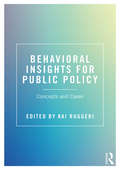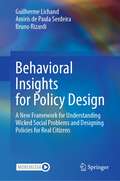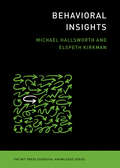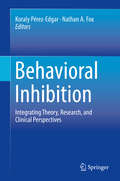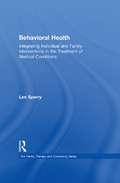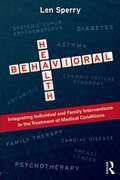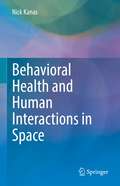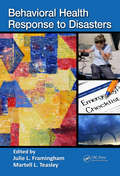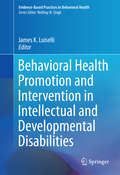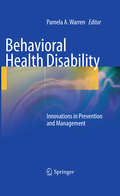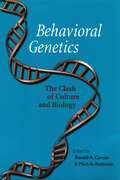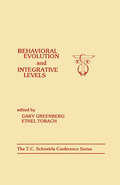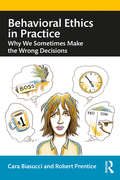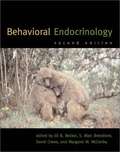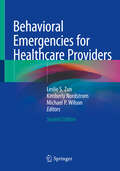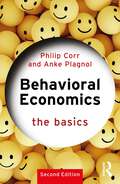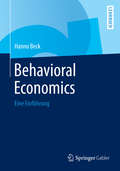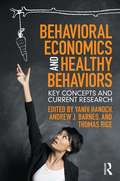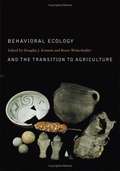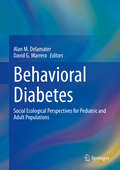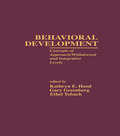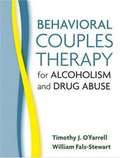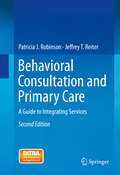- Table View
- List View
Behavioral Insights for Public Policy: Concepts and Cases
by Kai RuggeriThe first decades of the 21st century have offered a remarkable shift in how policies are made as well as who designs them. Until this period, local, regional, and national policy advisors largely comprised economists, lawyers, and financial experts. But in an era when behavioral scientists are increasingly being asked to demonstrate the impact of their research, many are playing a much greater role in policy making across a range of sectors as a result. Written by a team of authors working across both academia and government, Behavioral Insights for Public Policy is the first textbook to fully examine how psychology can be applied to a range of public policy areas. It addresses a wide variety of topics from the origins of policy as well as major findings from behavioral economics and nudge theory, to large-scale applications of behavioral insights. The compilation is the first of its kind to broadly cover the underlying theory, history, major empirical examples, and practical applications to policy of nudges (or behavioral insights) for teaching and study in higher education. Featuring over 100 empirical examples of how behavioral insights are being used to address some of the most critical challenges faced globally, the book also includes a unique chapter from an organization actively implementing behavioral insights in policies along with various government institutions. Also featuring case studies looking at key policy issues, learning outcomes, a glossary of key terms, and an accompanying website, this important book will be essential reading for any student of applied psychology. It has also been produced for others interested in the topic from social, political, and economic sciences, as well as those in government looking for an overview of the key issues.
Behavioral Insights for Policy Design: A New Framework for Understanding Wicked Social Problems and Designing Policies for Real Citizens
by Guilherme Lichand Amiris de Serdeira Bruno RizardiThis textbook is an introductory guide to applying behavioral sciences and systemic thinking into public policy design and implementation. It presents an innovative public management toolkit to handle ‘wicked’ social problems – those not very responsive to traditional public policy instruments – by incorporating insights from the behavioral sciences and systemic design in the diagnostics of public problems, based on the motivations and constraints of the ‘real citizen’ – beyond the ideal citizen’s perfectly rational intentions and plans devoid of social context or self-control problems. This volume aims to motivate the inclusion of broader and deeper insights from the behavioral sciences – especially behavioral economics, cognitive psychology, and social psychology – to the repertoire of public managers by introducing new methodologies for diagnosing the root causes behind public problems and for designing effective policies to address them. The new diagnosis tool – the MSI framework (an acronym for Motivation, Self-control, and Inattention problems) –, will help identify new mechanisms underlying social problems or reinterpret known problems based on behavioral insights. The new methodology for policy design – the PRIx framework (an acronym for Pricing policies, Regulatory policies, and Information policies) –, will enrich existing policy tools with such behavioral insights. Behavioral Insights for Policy Design: A New Framework for Understanding Wicked Social Problems and Designing Policies for Real Citizens will be a useful and practical guide to public managers and students of graduate and advanced undergraduate courses in public management interested in learning how to apply innovative tools and methodologies inspired by the behavioral sciences into public policy design in a simple and practical way, even when dealing with complex social problems.
Behavioral Insights (The MIT Press Essential Knowledge Series)
by Michael Hallsworth Elspeth KirkmanAn accessible introduction to the behavioral insights approach, which applies evidence about human behavior to practical problems.Our behavior is strongly influenced by factors that lie outside our conscious awareness, although we tend to underestimate the power of this "automatic" side of our behavior. As a result, governments make ineffective policies, businesses create bad products, and individuals make unrealistic plans. In contrast, the behavioral insights approach applies evidence about actual human behavior--rather than assumptions about it--to practical problems. This volume in the MIT Press Essential Knowledge series, written by two leading experts in the field, offers an accessible introduction to behavioral insights, describing core features, origins, and practical examples.
Behavioral Inhibition: Integrating Theory, Research, and Clinical Perspectives
by Nathan A. Fox Koraly Pérez-EdgarThis book examines three decades of research on behavioral inhibition (BI), addressing its underlying biological, psychological, and social markers of development and functioning. It offers a theory-to-practice overview of behavioral inhibition and explores its cognitive component as well as its relationship to shyness, anxiety, and social withdrawal. The volume traces the emergence of BI during infancy through its occurrences across childhood. In addition, the book details the biological basis of BI and explores ways in which it is amenable to environmental modeling. Its chapters explore the neural systems underlying developmental milestones, address lingering questions (e.g., limitations of studying BI in laboratory settings and debatable benefits of self-regulatory processes), and provide recommendations for future research.Key areas of coverage include:Animal models of behavioral inhibition.Social functioning and peer relationships in BI.Attention mechanisms in behavioral inhibition.BI and associative learning of fear.Behavioral inhibition and prevention of internalizing distress in early childhood. The relations between BI, cognitive control, and anxiety.Behavioral Inhibition is a must-have resource for researchers, clinicians, scientist-practitioners, and graduate students across such fields as developmental psychology, psychiatry, social work, cognitive and affective developmental neuroscience, child and school psychology, educational psychology, and pediatrics.
Behavioral Health: Integrating Individual and Family Interventions in the Treatment of Medical Conditions (Routledge Series on Family Therapy and Counseling)
by Len SperryIn this age of accountability, and irrespective of whether they work in health-care settings or conventional mental health settings, all therapists will be increasingly expected to provide effective psychosocial treatment to individuals and families who face co-morbid medical conditions. Statistics these conditions are daunting: 75 percent of adults over age 65 and 50 percent of Americans constantly experience chronic medical symptoms, and prevalence rates of chronic medical conditions that are more than three times higher than mental illness. While it can be helpful to conceptualize treatment in terms of individual dynamics and utilize cognitive behavioral strategies, it can be much more effective to conceptualize family as well as individual dynamics and to utilize systemic interventions when indicated. Effective Treatment of Individuals and Families Facing Medical Conditions addresses the need for these types of interventions. It provides background information on 12 common medical conditions, and includes discussions of family dynamics as well as medical and psychosocial treatments. While recognizing the role of personality, culture, and illness dynamics, it emphasizes the centrality of family dynamics in conceptualizing and implementing interventions.
Behavioral Health: Integrating Individual And Family Interventions In The Treatment Of Medical Conditions
by Len SperryThe emergence of behavioral health, how it is practiced, and how it will be practiced is at the heart of this book. Len Sperry, a prominent author and educator, is one of the first to describe and advocate for an approach to health care that can significantly increase the efficacy and efficiency of health care and reduce costs for patients with chronic medical conditions. He does so by addressing both core theoretical constructs and core practice competencies to help readers comfortably provide effective integrated psychosocial treatment to individuals and families. <p><p> His book is split into three parts. The first provides an overview of the key family and personality dynamics and how medical conditions impact individual and family members throughout the family life cycle. Important considerations in this part include ethical and clinical issues, spiritual considerations, treatment non-compliance, motivational interviewing, and case conceptualization. Of particular importance is Dr. Sperry’s description of four illness stages, which reflect patients’ psychosocial adjustment to their chronic illnesses. The second part consists of seven chapters dedicated to common medical conditions, followed by the last part that addresses integrated behavioral health competency and competency-based training. <p> Behavioral health clinicians and trainees in various behavioral health specialties, including individual psychotherapists and family therapists, will find this practical book of interest and value to their work. No matter their experience, all readers will walk away from this book with the knowledge necessary to increase motivation, deal with non-compliance issues, and tailor therapeutic change, while increasing treatment efficacy and efficiency with their patients.
Behavioral Health and Human Interactions in Space
by Nick KanasThis textbook covers the range of psychological and interpersonal issues that can affect astronauts living and working in space. It deals with the three major risk areas cited by NASA’s Behavioral Health and Performance Element: Behavioral Medicine, Team Risk, and Sleep Risk. Based on the author’s more than 50 years of experience in space-related activities writing, conducting research, and teaching undergraduate and graduate courses, the book follows a comprehensive range of topics that include: cognitive effects; psychiatric issues; cultural influences; salutogenic and positive aspects of space travel; autonomy and delayed communication; current plans to return to the Moon and Mars; analysis of study environments such as the polar regions, submersible habitats, and space simulation facilities; and more. It draws on research, literature, and case studies from the 1950s onward, showing readers in a natural and accessible way how the field has progressed over time. The book contains ample end-of-chapter summaries and exercises as well as a complete glossary of key terms. As such, it will serve students taking courses in aerospace psychology, psychiatry, sociology, human factors, medicine, and related social sciences, in addition to space industry professionals and others interested in the complexities of people living and working in space.
Behavioral Health Response to Disasters
by Julie L. Framingham, Martell L. TeasleyDisasters can cause long-term disruptions to the routines of individuals and communities, placing survivors at risk of developing serious mental health and substance abuse problems. Disaster behavioral health services provide emotional support, help normalize stress reactions, assess recovery options, and encourage healthy coping behaviors. They al
Behavioral Health Promotion and Intervention in Intellectual and Developmental Disabilities (Evidence-Based Practices in Behavioral Health)
by James K. LuiselliThis book discusses the latest evidence-based practices andhow they can be implemented to address health problems in people withintellectual and developmental disabilities (IDD). It offers variousintervention and prevention strategies for treating commonly encountered issuesin patients with IDD, such as eating and sleeping disorders, repetitiveself-harming behaviors, and personal hygiene problems. Primary strategiesinclude encouraging healthful habits, reducing noncompliance and risk-takingbehaviors, and direct intervention to promote optimum functioning while reducingdiscomfort, frustration, and adverse behaviors. In addition, contributors describetraining and consultation models to enable readers to work more effectivelywith practitioners, clinicians, and parents as well as with the patientsthemselves. Topics featured in this book include: Compliance with medical routines. Increasing and maintaining exercise and other physical activities. Assistive technologies in severe and multiple disabilities. Substance use and health-related issues. Consultation with medical and healthcare providers. Parent training and support. Behavioral HealthPromotion and Intervention in Intellectual and Developmental Disabilities isa valuable resource for researchers, clinicians, and graduate students inclinical psychology, behavioral therapy/rehabilitation, social work, publichealth, and other interrelated fields.
Behavioral Health Disability: Innovations in Prevention and Management
by Pamela A WarrenThe purpose of this book is to demystify the evaluation and management of common psychological disorders and psychosocial issues which impact all realms of medical and mental health practice. These types of issues are often seen as "medical quicksand" by treating professionals, employers, and insurers alike. Consequently, there is a system-wide avoidance of these disorders that significantly increase medical and disability costs. However, there is a considerable cost to individual and society as well in terms of the reduction in the quality of life of the individual and the high costs associated with chronic use of medical resources. It is essential to note the complexity of the psychiatric and psychosocial disability conundrum. This dilemma is not limited solely to short-term, minor problems but leach into the full spectrum of disability systems: private insurance, disability insurance, and federal programs for disabled persons. This book will provide innovative tools to confidently navigate the disability process by implementing, for the first time, true objective information coupled with the state-of-the-art evidence-based research. Thus, all individuals involved in the psychiatric disability process will be able to properly manage the process, optimize the treatment for an optimal outcome and avoid iatrogenic disability. In particular, the book will provide a clear evidence-based guidance for the evaluation and treatment process not only for individuals with obvious psychological problems, but for symptomatic individual with no discernable etiology or who simply never seem to get well.
Behavioral Genetics: The Clash of Culture and Biology
by Ronald A. Carson and Mark A. RothsteinScientists conducting human genome research are identifying genetic disorders and traits at an accelerating rate. Genetic factors in human behavior appear particularly complex and slow to emerge, yet are raising their own set of difficult ethical, legal, and social issues. In Behavioral Genetics: The Clash of Culture and Biology, Ronald Carson and Mark Rothstein bring together well-known experts from the fields of genetics, ethics, neuroscience, psychiatry, sociology, and law to address the cultural, legal, and biological underpinnings of behavioral genetics. The authors discuss a broad range of topics, including the ethical questions arising from gene therapy and screening, molecular research in psychiatry, and the legal ramifications and social consequences of behavioral genetic information. Throughout, they focus on two basic concerns: the quality of the science behind behavioral genetic claims and the need to formulate an appropriate, ethically defensible response when the science turns out to be good.
Behavioral Genetics: The Clash of Culture and Biology
by Ronald A. Carson and Mark A. RothsteinNine essays examining the ethical, cultural, legal, and biological underpinnings of behavioral genetics.Scientists conducting human genome research are identifying genetic disorders and traits at an accelerating rate. Genetic factors in human behavior appear particularly complex and slow to emerge, yet are raising their own set of difficult ethical, legal, and social issues. In Behavioral Genetics: The Clash of Culture and Biology, Ronald Carson and Mark Rothstein bring together well-known experts from the fields of genetics, ethics, neuroscience, psychiatry, sociology, and law to address the cultural, legal, and biological underpinnings of behavioral genetics. The authors discuss a broad range of topics, including the ethical questions arising from gene therapy and screening, molecular research in psychiatry, and the legal ramifications and social consequences of behavioral genetic information. Throughout, they focus on two basic concerns: the quality of the science behind behavioral genetic claims and the need to formulate an appropriate, ethically defensible response when the science turns out to be good.“This book is well written and stimulating. The issues it raises are important for scientists and for those working in the legal and social-services fields, but they clearly also have relevance for everyone.” —The New England Journal of Medicine“This . . . is the best introduction to behavioral genetics that I have read. The varying viewpoints . . . are presented with such clarity that [this book] should appeal to the general public and serve as a basic text for college courses.” —Jay Katz, Elizabeth K. Dollard Professor Emeritus of Law, Medicine, and Psychiatry, Harvey L. Karp Professiorial Lecturer in Law and Psychoanalysis, Yale Law School
Behavioral Evolution and Integrative Levels: The T.c. Schneirla Conferences Series, Volume 1 (T.C. Schneirla Conferences Series)
by Gary Greenberg and Ethel TobachFirst published in 1984. Routledge is an imprint of Taylor & Francis, an informa company.
Behavioral Ethics in Practice: Why We Sometimes Make the Wrong Decisions
by Cara Biasucci Robert PrenticeThis book is an accessible, research-based introduction to behavioral ethics. Often ethics education is incomplete because it ignores how and why people make moral decisions. But using exciting new research from fields such as behavioural psychology, cognitive science, and evolutionary biology, the study of behavioural ethics uncovers the common reasons why good people often screw up. Scientists have long studied the ways human beings make decisions, but only recently have researchers begun to focus specifically on ethical decision making. Unlike philosophy and religion, which aim to tell people how to think and act about various moral issues, behavioral ethics research reveals the factors that influence how people really make moral decisions. Most people get into ethical trouble for doing obviously wrong things. Aristotle cannot help, but learning about behavioral ethics can. By supplementing traditional approaches to teaching ethics with a clear, detailed, research-based introduction to behavioral ethics, beginners can quickly become familiar with the important elements of this new field. This book includes the bonus of being coordinated with Ethics Unwrapped – a free, online, educational resource featuring award-winning videos and teaching materials on a variety of behavioral ethics (and general ethics) topics. This book is a useful supplement for virtually every ethics course, and important in any course where incorporating practical ethics in an engaging manner is paramount. The content applies to every discipline –business ethics, journalism, medicine, legal ethics, and others – because its chief subject is the nature of moral decision making. The book is also highly relevant to practitioners across all sectors.
Behavioral Endocrinology (2nd edition)
by Jill B. Becker S. Marc Breedlove David Crews Margaret M. MccarthyThis popular behavioral endocrinology text provides detailed information on what hormones are, how they affect cells, and how such effects can alter the behavior of animals, including humans. Presenting a broad continuum of levels of analysis, from molecular to evolutionary, the book discusses how genes work, the structure of cells, the interactions of endocrine organs, the behavior of individuals, the structure of social hierarchies, and the evolution of mating systems. The second edition, while maintaining the strengths of the first edition, has been thoroughly revised to reflect recent developments in genetics and molecular biology and related social concerns. It contains four new chapters: on the use of molecular biology techniques in behavioral endocrinology, on psychoneuroimmunology, on hormonal influences on sensorimotor function, and on cognitive function in nonhuman animals.
Behavioral Emergencies for the Emergency Physician
by Mary Nan S. Mallory Lara G. Chepenik Leslie S. ZunEmergency physicians, in all practice settings, care for patients with both undifferentiated psycho-behavioral presentations and established psychiatric illness. This reference-based text goes beyond diagnostics, providing practical input from physicians experienced with adult emergency psychiatric patients. Physicians will increase their understanding and gain confidence working with these patients, even when specialized psychiatric back-up is lacking. Behavioral Emergencies for the Emergency Physician is comprehensive, covering the pre-hospital setting and advising on evidence-based practice; from collaborating with psychiatric colleagues to establishing a psychiatric service in your ED. Sedation, restraint and seclusion are outlined. Potential dilemmas when treating pregnant, geriatric or homeless patients with mental illness are discussed in detail, along with the more challenging behavioral diagnoses such as malingering, factitious and personality disorders. This go-to, comprehensive volume is invaluable for trainee and experienced emergency physicians, as well as psychiatrists, psychologists, psychiatric and emergency department nurses and other mental health workers.
Behavioral Emergencies for Healthcare Providers
by Leslie S. Zun Michael P. Wilson Kimberly NordstromThis fully updated second edition focuses on mental illness, both globally and in terms of specific mental-health-related visits encountered in emergency department settings, and provides practical input from physicians experienced with adult emergency psychiatric patients. It covers the pre-hospital setting and advising on evidence-based practice; from collaborating with psychiatric colleagues to establishing a psychiatric service in your emergency department. Potential dilemmas when treating pregnant, geriatric or homeless patients with mental illness are discussed in detail, along with the more challenging behavioral diagnoses such as substance abuse, factitious and personality disorders, delirium, dementia, and PTSD. The new edition of Behavioral Emergencies for Healthcare Providers will be an invaluable resource for psychiatrists, psychologists, psychiatric and emergency department nurses, trainee and experienced emergency physicians, and other mental health workers.
Behavioral Economics: The Basics (The Basics)
by Philip Corr Anke PlagnolThe second edition of Behavioral Economics: The Basics summarizes behavioral economics, which uses insights from the social sciences, especially psychology, to explain real-world economic behavior. Behavioral economic insights are routinely used not only to understand the choices people make but also to influence them, whether the aim is to enable citizens to lead healthier and wealthier lives, or to turn browsers into buyers. Revised and updated throughout with fresh current-event examples, Behavioral Economics: The Basics provides a rigorous yet accessible overview of the field that attempts to uncover the psychological processes which mediate all the economic judgements and decisions we make. The book showcases how behavioral economics is rooted in some now-old (philosophical, political, and moral) ideas surrounding economics, and in an important sense is a modern expression of some long-standing criticisms of mainstream economics. It contrasts the neoclassical economic perspective (ECON) with a more realistic perspective (HUMAN – the flesh-and-blood economic agent who is not perfect in all respects but who manages to do the best under limitations and constraints). This is a comprehensive overview of the whole field, covering all the main areas, presented in a rigorous yet accessible form. It should especially appeal to students, those with an interest in applying behavioral economic knowledge in their professional life, and anyone who wants to know how they are being influenced every day of their lives by (usually unseen) behavioral insights.
Behavioral Economics: Eine Einführung
by Hanno BeckSeit den siebziger Jahren haben die Erkenntnisse und Forschungen der Psychologie auch Einzug in die Wirtschaftswissenschaften gehalten – sie sollen das Menschenbild der Ökonomen und ihre Modelle realistischer machen. Dieses Buch beschreibt die wichtigsten Methoden, Konzepte und Erkenntnisse der verhaltenswissenschaftlichen Ökonomik (Behavioral Economics) und weitere dazugehörige Forschungsgebiete wie Glücksforschung, Fairness und Neuroökonomie. Das Lehrbuch stellt die wichtigsten theoretischen und empirischen Befunde und Ideen vor, um sie anschließend einer kritischen Würdigung zu unterziehen. Es ist sowohl für Studierende geeignet als auch für Dozenten und Wissenschaftler, die sich über den aktuellen Forschungsstand der Disziplin informieren wollen.
Behavioral Economics and Healthy Behaviors: Key Concepts and Current Research
by Thomas Rice Andrew Barnes Yaniv HanochThe field of behavioural economics can tell us a great deal about cognitive bias and unconscious decision-making, challenging the orthodox economic model whereby consumers make rational and informed choices. But it is in the arena of health that it perhaps offers individuals and governments the most value. In this important new book, the most pernicious health issues we face today are examined through a behavioral economic lens. It provides an essential and timely overview of how this growing field of study can reframe and offer solutions to some of the biggest health issues of our age. The book opens with an overview of the core theoretical concepts, after which each chapter assesses how behavioral economic research and practice can inform public policy across a range of health issues. Including chapters on tobacco, alcohol and drug use, physical activity, dietary intake, cancer screening and sexual health, the book integrates the key insights from the field to both developed and developing nations. Also asking important ethical questions around paternalism and informed choice, this book will be essential reading for students and researchers across psychology, economics and business and management, as well as public health professionals wishing for a concise overview of the role behavioral economics can potentially play in allowing people to live healthier lives.
Behavioral Ecology and the Transition to Agriculture
by Douglas J. Kennett Bruce WinterhalderThis innovative volume is the first collective effort by archaeologists and ethnographers to use concepts and models from human behavioral ecology to explore one of the most consequential transitions in human history: the origins of agriculture. Carefully balancing theory and detailed empirical study, and drawing from a series of ethnographic and archaeological case studies from eleven locations--including North and South America, Mesoamerica, Europe, the Near East, Africa, and the Pacific--the contributors to this volume examine the transition from hunting and gathering to farming and herding using a broad set of analytical models and concepts. These include diet breadth, central place foraging, ideal free distribution, discounting, risk sensitivity, population ecology, and costly signaling. An introductory chapter both charts the basics of the theory and notes areas of rapid advance in our understanding of how human subsistence systems evolve. Two concluding chapters by senior archaeologists reflect on the potential for human behavioral ecology to explain domestication and the transition from foraging to farming.
Behavioral Diabetes: Social Ecological Perspectives for Pediatric and Adult Populations
by David G. Marrero Alan M. DelamaterThis book presents an up-to-date review of behavioral factors in diabetes management across the lifespan: an update on medical management, epidemiology, and prognosis, and utilize an ecological framework to address various aspects of diabetes management for children and adults on the individual, social, community and medical system, and policy levels. The individual level examines biobehavioral and neuroendocrine factors for their role in the etiology of diabetes, as well as various demographic factors involved in health disparities, and specific psychological issues including distress and quality of life, depression and anxiety, eating disorders, and intervention approaches. Zooming out, the social level addresses the role of social support and family influences as well as group and family interventions to promote more effective diabetes management. The community level addresses medical system factors including the patient-physician relationship and transition programs, as well as community and school-based prevention programs. Finally, chapters also address how the policy level impacts diabetes management considering the role of health care, insurance, and school and workplace policy. Topics featured in this book include: Neuroendocrine and biobehavioral influences on diabetes Eating disorders in individuals with diabetesFamily influences and family therapies for children and adults with diabetesDepression and anxiety in children and adults with diabetes Behavioral Diabetes is a must-have resource for researchers, graduate students and fellows, as well as clinicians, therapists, and other practitioners involved in diabetes management across the lifespan. A secondary audience comprises individuals working in the community and policy levels, including but not limited to health care and medical systems administrators, as well as school and workplace policymakers. “This book is a comprehensive overview of the extremely important topic of behavioral diabetes. The issues encompassed in this book have evolved greatly over the last few decades and the editors have done a spectacular job in having the key experts on each of the many topics review the literature while at the same time keeping it practical for both clinicians and researchers.”--Irl B. Hirsch, MD, University of Washington, Seattle
Behavioral Development: Concepts of Approach/Withdrawal and Integrative Levels (Research in Developmental and Comparative Psychology #Vol. 1)
by Gary Greenberg Kathryn E. Hood Ethel TobachFirst Published in 1995. Behavioral Development is Volume 1 in the Research and Developmental and Comparative Psychology series - dedicated to honour the contributions of T. C. Schneirla. This volume represents the substantive content of the Fifth T. C. Schneirla Conference, held in November of 1989. The volume is divided into three parts: the significance of the intensity of the adequate stimulus; the process of development and the concept of integrative levels. Schneirla is still recognized as one of the foremost theoreticians in comparative psychology, and the rebirth of interest in comparative psychology is evident.
Behavioral Couples Therapy for Alcoholism and Drug Abuse
by William Fals-Stewart Timothy J. O'FarrellThis eminently practical guide presents an empirically supported approach for treating people with substance abuse problems and their spouses or domestic partners. Behavioral couples therapy (BCT) explicitly focuses on both substance use and relationship issues, and is readily compatible with 12-step approaches. Provided are all the materials needed to introduce BCT; implement a recovery contract to support abstinence; work with clients to increase positive activities, improve communication, and reduce relapse risks; and deal with special treatment challenges. Appendices include a condensed session-by-session treatment manual and 70 reproducible checklists, forms, and client education posters. The large-size format and lay-flat binding facilitate photocopying and enhance the book's clinical utility. Recommended by the National Institute for Clinical Excellence (NICE) for use in National Health Service treatment units
Behavioral Consultation and Primary Care: A Guide to Integrating Services
by Patricia J. Robinson Jeffrey T. Reiter"In this 2nd edition, Robinson and Reiter give us an updated blueprint for full integration of behavioral health and primary care in practice. They review the compelling rationale, but their real contribution is telling us exactly HOW to think about it and how to do it. This latest book is a must for anyone interested in population health and the nuts and bolts of full integration through using the Primary Care Behavioral Health Consultation model. " Susan H McDaniel Ph. D. , 2016 President, American Psychological Association Professor, University of Rochester Medical Center The best-selling guide to integrating behavioral health services into primary care is now updated, expanded and better than ever! Integration is exploding in growth, and it is moving inexorably toward the model outlined here. To keep pace, this revised text is a must for primary care clinicians and administrators. It is also essential reading for graduate classes in a variety of disciplines, including social work, psychology, and medicine. This updated edition includes: · A refined presentation of the Primary Care Behavioral Health (PCBH) model · The latest terms, trends and innovations in primary care · Comprehensive strategies and resource lists for hiring and training new Behavioral Health Consultants (BHC) · Step-by-step guidance for implementing the PCBH model · A plethora of evolved practice tools, including new Core Competency Tools for BHCs and primary care providers · Sample interventions for behaviorally influenced problems · The use of "Third Wave" behavior therapies in primary care · Detailed program evaluation instructions and tools · The latest on financing integrated care · An entire chapter on understanding and addressing the prescription drug abuse epidemic · Experienced guidance on ethical issues in the PCBH model · Improved patient education handouts With all of the changes in health care, the potential for the Primary Care Behavioral Health (PCBH) model to improve primary care--and the health of the population--is greater than ever. This book should be the first read for anyone interested in realizing the potential of integration.
